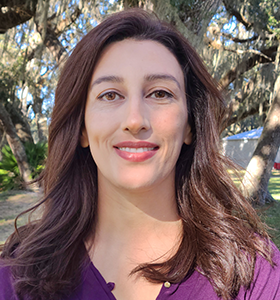Dr. Golmar Golmohammadi is one of the newest members of the UF/IFAS soil and water sciences department. She is an assistant professor of watershed hydrology and biogeochemistry and works at the UF/IFAS Range Cattle Research and Education Center in Ona, Fla. We asked her a little about how her career has developed and what her future research goals are.
Can you tell us a little about your background?

I started my academic training by completing a B.Sc. and M.Sc. in Agricultural Engineering. I then completed a M.Sc. thesis at Bu Ali Sina University, Iran, working on geostatistical methods on spatial distribution of precipitation and flow. I moved to Canada to continue my education in hydrology and water quality modeling. I earned my Ph.D. from McGill University in Montreal, Canada. My Ph.D. research focused on the development of a new hydrologic model. This integrated model offers an effective decision-making tool for researchers and watershed managers.
I received a post-doctoral fellowship from the School of Engineering at the University of Guelph shortly after my graduation and continued to work on watershed modeling. I investigated the impact of water management practices on hydrology and water quality at the watershed scale. I also investigated the impact of climate change on the quantity and quality of water resources in agricultural fields.
Most recently, for the past four years, while maintaining my academic teaching and research position at the University of Guelph, Canada, I have been working as a water resources engineer for a Consulting firm (Aquafor Beech) in Ontario, Canada. I was involved in water resources protection projects, implementation strategies of best management practices, and selecting the preferred alternative solutions. I develop hydrological models, considering water quality constituents, implementing the ecological aspects of the study, and characterizing the interactions between ecological and hydrological components of the watershed.
What are your research interests?
My future research will aim towards understanding the impacts of complex watershed processes, agricultural management, and human behavior on hydrology and pollutants fate and transport in natural and engineered environments. Ultimately my goal is to develop sustainable water management practices in the face of future climate and land-use change.
I am also interested in developing an integrated watershed scale model to be capable of simulating BMPs in Agricultural areas and Low Impact Development (LIDs) in developed lands of a mixed watershed.
What prompted you to apply for this job with UF/IFAS soil and water sciences?
Several reasons motivated me to apply for Watershed Hydrology and Biogeochemistry position at the Range Cattle REC with the UF/IFAS Soil and Water Sciences Department. One of the most important reasons, I believe, was my background and expertise, which are well-match to my current position.
I have been involved in many interdisciplinary/multidisciplinary projects in both academia and industry. As part of these projects, I was involved in water resources protection, implementation strategies of best management practices, and selecting the preferred alternative solutions.
These projects highlighted the importance of developing sustainable water management practices to conserve water and improve water quality. These projects also gave me the opportunity to network, cooperate, and collaborate with faculty members, professionals, organizations, boards, and government agencies to address issues that may impact watersheds. Now, I hope to employ some of the skills and tools I learned in these projects in the Great Lakes area, to the watersheds of Florida.
What is your vision for your research projects in IFAS?
I will continue my study and research in water resources, hydrology, and biogeochemistry (field and watershed scales) throughout the state of Florida.
I believe that collaboration with existing faculty in the RCREC, Soil and Water Sciences Department, and IFAS will greatly enhance my research pursuits, which results in scientifically robust studies.
I also hope, given my interdisciplinary academic, research, and extension experience, I could use field and laboratory experimentation, hydrologic modeling, and monitoring to improve our understanding of natural and engineered systems.
In addition to my research, I will be developing an extension program focused on developing a sustainable water resource, both quantity and quality. I will do this by adopting appropriate water management methods and implementing best management practices to sustain water resources and production while protecting water quality under future climate change.
What do you foresee as being the biggest challenge ahead?
Developing sustainable water management practices to conserve water and improve water quality is often more complicated than implementing conventional methods. However, it impacts the water resources quantity and quality, the productivity of the crops, and many other factors.
In addition, the best management practices are depending on local conditions and may vary by location and time. Also, there are trade-offs with any management practice. Therefore, making decisions require strong judgment and experience. I think one of the biggest challenges for me moving forward in my field of research is trying to develop sustainable water management practices. Also, trying to work with the various stakeholders to enhance water quantity and quality.
 0
0
